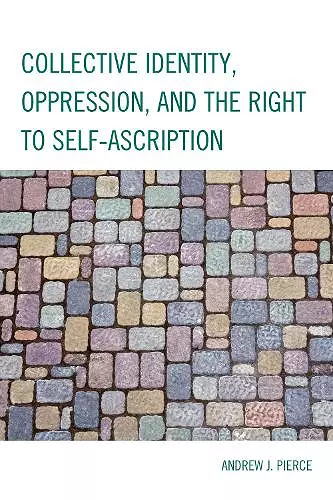Collective Identity, Oppression, and the Right to Self-Ascription
Format:Paperback
Publisher:Lexington Books
Published:5th Dec '13
Currently unavailable, and unfortunately no date known when it will be back
This paperback is available in another edition too:
- Hardback£87.00(9780739171905)

Collective Identity, Oppression, and the Right to Self-Ascription argues that groups have an irreducibly collective right to determine the meaning of their shared group identity, and that such a right is especially important for historically oppressed groups. The author specifies this right by way of a modified discourse ethic, demonstrating that it can provide the foundation for a conception of identity politics that avoids many of its usual pitfalls. The focus throughout is on racial identity, which provides a test case for the theory. That is, it investigates what it would mean for racial identities to be self-ascribed rather than imposed, establishing the possible role racial identity might play in a just society. The book thus makes a unique contribution to both the field of critical theory, which has been woefully silent on issues of race, and to race theory, which often either presumes that a just society would be a raceless society, or focuses primarily on understanding existing racial inequalities, in the manner typical of so-called “non-ideal theory.”
Pierce's probing analysis of the limits and possibilities of current thinking about multiculturalism, race theory, and group rights is comprehensive, judicious, and thoroughly original. Elegantly written, it represents the first sustained application of critical theory and discourse theory to the most current analytic literature in the field, and the most exhaustive attempt hitherto undertaken to rethink a positive and legitimate conception of racial identity from that perspective. -- David Ingram, Loyola University, Chicago
If mainstream liberal political philosophy now grudgingly recognizes cultural minorities as well as atomic individuals, it still balks at admitting the centrality of group oppression, and the corresponding ontology of subordinating and subordinated groups, to liberal polities. Racial oppression, for example, is displaced and obfuscated by a discourse of multiculturalism. In this brief but penetrating book, Andrew Pierce shows the theoretical inadequacy of multicultural liberalism for handling these issues. Instead he urges a redemptive reconstruction of identity politics within a modified Habermasian theory that excludes as illegitimate those racial identities predicated on the disrespect and exploitation of others. Synthesizing elements from the analytic and Continental political traditions, the result is a challenge to mainstream theory very much worth reading. -- Charles Mills, John Evans Professor of Moral and Intellectual Philosophy, Northwestern University
Pierce's approach is highly original, as far as I am aware. This book is worthy reading for anyone interested in issues of group rights, oppression, and identity politics. * Notre Dame Philosophical Reviews *
This first book by Pierce (Loyola Univ., Chicago) is a tremendous success. In four chapters, the author lays waste to the dogmatic rejection of identity politics and the current liberal account of oppressed groups in democratic societies. Chapter 1 is a critique of multicultural liberals, primarily Will Kymlicka's focus on group identity as cultural. Chapter 2 offers a fantastic discussion of why oppressed groups' self-ascription is intrinsically valuable. Chapter 3 provides a refreshing argument for the necessity of identity politics. By differentiating between ‘retributive’ and ‘discursive-democratic’ identity politics, Pierce carefully shows how identity politics is necessary to real challenges to systemic oppression. This position carries readers to the theme of the final chapter, namely, that ‘the strategic struggle against oppression as well as the ideally functioning processes of democratic politics both presuppose and require certain kinds of collective identity ... and racial identity in specific.’ This, however, does not let white conservatives off the hook, since ‘whiteness is not discursively justifiable, illegitimate ... and lacks any substantive foundation.’ This book will be a heartbreaking discovery for multicultural liberals, but a well-written contribution to conversations by audiences familiar with the contested debates of the field. Summing Up: Highly recommended. Upper-level undergraduates and above. * CHOICE *
ISBN: 9780739190579
Dimensions: 228mm x 153mm x 11mm
Weight: 213g
142 pages